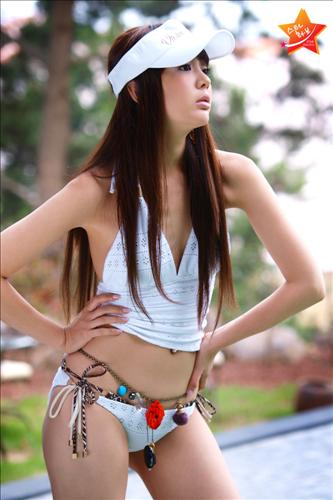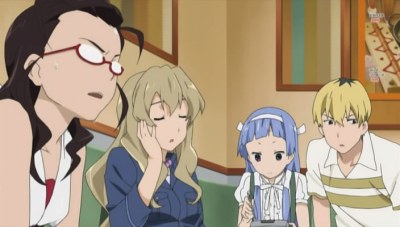Kannagi, a quick cultural comparison and final thoughts
February 9, 2009

Totally relevant
In episode 4 of Kannagi, otaku expert Akiba made an interesting observation that intrigued me on cultural level. I do not know much about Japanese idol culture (but I trust many have covered that), but his comments concerning idol culture in Japan was interesting because of its similarities and differences compared to what I observed from Korean idol culture (it’s more of ‘entertainer’ culture but I digress), so I guess I’ll be talking a little about that. Feel free to skip to the next screenshot if you have no interest and just want to read my final thoughts on Kannagi.
Akiba says, “There’s no idol who’s working all around”, but I think that accuractely describes majority of Korean celebrities in the field of popular media, sincem ost of them are active in various mediums all around. For example, idols who are new into their singing careers are by default expected to at some point feature in numerous variety/talk shows. They do this mostly because,
1) as a side job, as Korea is one of the most wired country in the world and hence download free music like crazy
2) promoting their albums/events
3) testing of their attributes in other areas such as acting, comedy and conversation skills. Through these variety shows an idol has the opportunity to be cast in dramas (and then acting), or as a host for other variety shows, etc.
Also interesting is Akiba’s comment on idols of niche area. In recent years Korean entertainment industry has seen increasing number of celebrities in fields more obscure than you know, singing and acting. The top picture for example is of a popular female comedian. Another increasingly popular niche idols are announcers being casting as hosts for other variety shows. Their elegant and know-it-all image serve as an excellent contrast to the often comically looking, sarcastic male co-host at the age of 30~40, and often these usually ‘untouchable’ images are exploited by making fool of themselves (which people find MOE -__-). The difference here between Akiba’s insight on Japanese and mine on Korean is that Korean celebrities of such niche area are making their ways into more popular realm, such as releasing their albums, becoming more active in variety shows and being cast in K-dramas. And of course there are pro Starcraft gamers who have gained celebrity status. It baffles the mind.

I also enjoyed episode 10 because, its sheer epic execution aside, karaoke is one of the most popular and conventional venue for socialising in Korean. And like Akiba the Wise says, reading the atmosphere here is the key. Choose your songs wisely or expect indifferent/awkward response. I also suggest practicising hip hop songs, as it's both friendly to tone-deafs and serves as a refreshingly exciting change from too much pop and ballad.
As for my final thoughts on Kannagi,
# I loved the comedy in general. Many amusing and ROFL moments to be had, not a single dull episode.
# Characters were all hilarious, and the chemistry was great, even if they are based on cliched archetypes. This goes back to the points I’ve made in previous posts on the architecture of Utena and Avatar. There is very few original characters (if any), it’s all about experimenting with various archetypes and gimmicks to form new affective connections. Nagi is tsundere, but ultimately she is perceived as an uniquely quirky and mischievous character.
# Animation was very expressive in characters’ gestures, and of their emotions.
# I loved the voice actings, practically all of them excelled in their roles. I’m tempted to give more credit to the director, like I would to Kou Matsuo for his Red Garden and Kure-nai.
# I wouldn’t say the ‘serious side’ of Kannagi was brilliant, but they were tense and immersive, and wasn’t at all jarring when juxtaposed to more comedic elements.
So yes, Kannagi easily gets my recommendation.

February 9, 2009 at 4:44 pm
What do you think about the spate of Korean celebrity suicides in the last few years? Overwork??
February 10, 2009 at 12:24 am
Definitely not because of overwork. I’d say it’s the society’s tendency to be swallowed up in media hype, and their intolerant views. They all committed suicide when their reputations were at their worst, i.e. the most controversial and recent example (최진실), hanged herself when she was accused of driving her friend’s husband to death. Then there is the singer Yuni, who was attacked by people on internet because she was being too ‘slutty’. This thing about cyber-terrorism and its psychological effects on people differ obviously (some celebs ignore them, some celebs use them deliberately to create ‘asshole’ image) but let’s just say that it’s enough to cancel TV programs, change who’s hosting the variety shows, and evidently lead celebs to commit suicide. I think such cases can be minimised only if our society was more tolerant and forgiving of the way other people dress, behave.
Another controversial example, which didn’t lead this particular celeb to suicide, but it got him banned from Korea because he attained US citizenship (you forfeit Korean citizenship if you get another country’s citizenship). Yea it’s pretty unelievable. The moment he got US citizenship, people assumed the guy didn’t want to take the compulsory 2 years military training, and the government banned him from entering Korea. Another reason why Kim Ki Duk’s films are doing so bad in his own country compared to his success in more understanding and forgiving societies, most notably those in Europe.
February 10, 2009 at 12:42 am
The directing in Kannagi was outstanding, and it’s even more amazing when you consider that this was the dude who got fired from Lucky Star. It actually gives a bit of credence to some of the more crazy conspiracy theories that there were forces in play influencing Lucky Star far outside the control of KyoAni (hence: “Buy Haruhi DVDs and other Kadokawa products”).
February 10, 2009 at 12:59 am
I don’t remember that conspiracy theory, but it does make a lot of sense considering how the new direction wasn’t all that different aside from KyoAni plugging.
And I’m just going to assume that Kaoishin started the theory…
March 27, 2009 at 2:04 pm
since you touch on korean music in this post (kinda), i thought it’d be the most appropriate to write this. i just read online that park jiyoon is about to release a 7th album. if you hear or read anything about this could you tell me? i adore jiyoon, but i don’t read korean so it’s hard to keep track. thanks!
March 27, 2009 at 2:21 pm
Not sure what kind of info you are looking for but just by quickly searching few popular Korean sites, there are lot of small details that you might find interesting. I’m bit tired right now, but I think I can gather some infos for you tomorrow since this is also an artist that interest me ^^
And I was going to say ‘you can spam my MAL comment box to talk about irrelevant stuffs’ but I see that you have no MAL account to ho ho…
March 27, 2009 at 2:24 pm
thanx! i’d be curious as to name of album if any, cover pics, single, any details etc..
btw, my e-mail is animekritik@hotmail.com